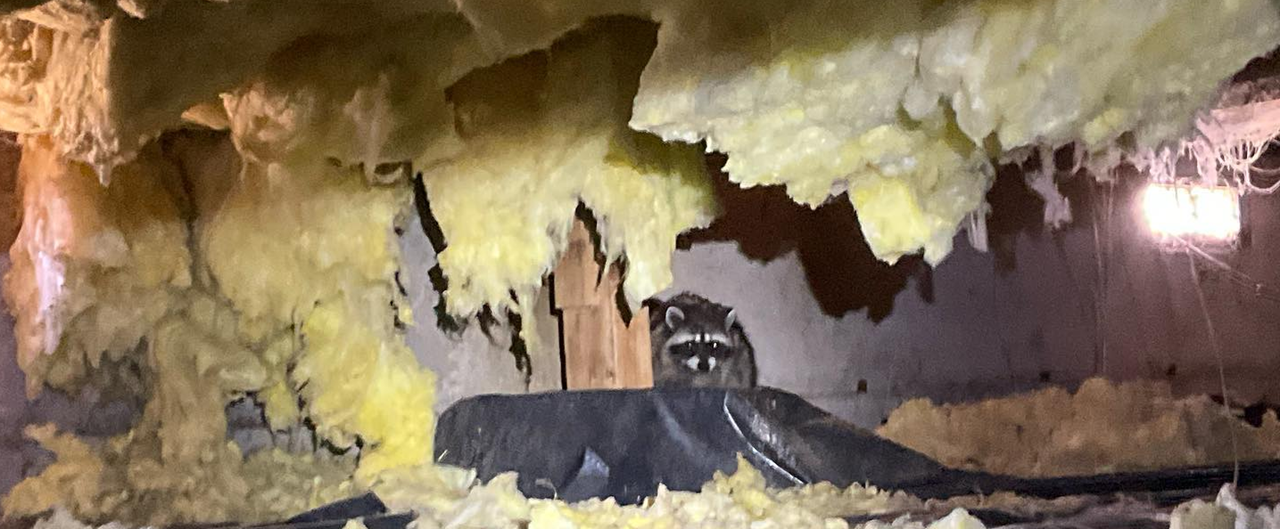
Yes. Raccoons are dangerous.
Most people know raccoons are carriers of rabies, which can be deadly to people and pets. Raccoons are dangerous because they can spread other diseases, destroy your home, and potentially attack.
Need Help with Raccoon Infestation?
Find a Critter Control near you.
Do Raccoons Attack?
Raccoons are naturally shy animals that prefer to retreat when they sense humans nearby. However, as the pests’ natural habitat decreases and they adapt more to a human environment, that fear can dwindle.
Raccoons are dangerous to people and pets when cornered or protecting their young. Even if a raccoon seems calm or friendly, residents should never approach a wild animal. Most people know they are a rabies vector species. Both healthy raccoons or sick raccoons can attack, but a rabid raccoon is more likely to attack.
Raccoons will try to intimidate you before it attacks. They will make themselves appear larger by rounding their back, sticking their fur out, and elevating their tail. Behaviors like jumping repeatedly, bearing their teeth, and showing their claws. Raccoons will also make growling, shrieking, screaming, barking, and hissing vocalizations. If you observe these behaviors in a raccoon, they are about to attack.
How Dangerous Are Raccoons?
Defensive Fighters
Raccoons will attack if they feel threatened or perceive a threat to their young. About the same size or larger than a house cat, raccoons are strong and stocky. They will use their sharp claws and teeth to attack when they feel threatened and cornered.
Raccoons can especially dangerous during birthing season. Females are hyper vigilant with her young. A dog can easily stumble upon a raccoon den under a porch or shed. The mother will attack the unsuspecting dog. Raccoons have been known to kill small dogs and cats.
Avoid leaving dogs and cats unattended outside in an area with suspected raccoon activity. If a raccoon has attacked, seek immediate medical attention.
Disease Carriers
Many diseases carried by raccoons are dangerous to humans. Raccoons, skunks, and foxs are the terriestrial animals most often infected with rabies in the United States.
Raccoons can spread other diseases. Raccoon roundworm and leptospirosis are the most common raccoon diseases; both of which are spread from raccoon feces. Raccoons can spread other diseases to your pets like canine distemper, feline distemper, parvoviral enteritis, and infectious canine hepatitis.
Cleaning up raccoon droppings without proper safety equipment can expose you to these pathogens.
Property Damage
Raccoons can destroy your yard and garden. Raccoons will roll up freshly laid sod looking for grubs. Raccoons do not dig for grubs. If you see canonical shaped holes, you have skunks in your yard. Raccoons will eat fruits and vegetables from your garden.
The most common area we find a raccoon infestation is in the attic or in a chimney. These critters will also create dens in crawl spaces, basements, and under porches. Stumbling upon a raccoon den or attempting a DIY raccoon removal can put you in harm’s way.
Raccoon entry points generally are in hard-to-reach places. Raccoons can tear apart shingles, rip open soffits, and break through gable vents. These repairs can require tall ladders or work on the roof. Attempting these exclusion repairs is dangerous.
Preventing Raccoon Problems
The best course of action is to prevent a raccoon problem before it starts. Raccoons can live in a variety of habitats, but an area with water sources and easy access to food will attract the critters. Never purposefully feed a raccoon. A homeowner can limit food sources by securing trash cans with bungee cords, keeping pet food inside, and removing or securing bird feeders.
Raccoon removal should only be handled by professional wildlife control operators. The professionals at Critter Control will humanely remove the raccoon while keeping you and the animal safe. Once the raccoon is gone, we can repair any damage and clean up any health risks from the raccoon.
Get them out.
Keep them out.®
Experiencing a wildlife or pest issue? We can help! Complete this form and your local Critter Control® office will contact you to assist.
- How to Get Rid of Raccoons
- Raccoon Trapping Service
- Raccoon Control
- Baby Raccoons
- Dead Raccoon Removal
- Raccoon Diseases
- Do Raccoons Hibernate in Winter?
- Raccoon Damage
- Raccoon Diet
- Raccoon Poop
- Raccoons In Yards
- Raccoons in Basements
- Raccoons in Chimneys
- Raccoons in Crawl Spaces
- Raccoons in Houses
- Raccoons in Trash
- Raccoons in Trees
- Raccoons in Walls
- Raccoons on Roofs & in Soffits
- Raccoon Sounds
- Raccoon Tracks
- Raccoons in Attics & Ceilings
- What Does a Raccoon Look Like?